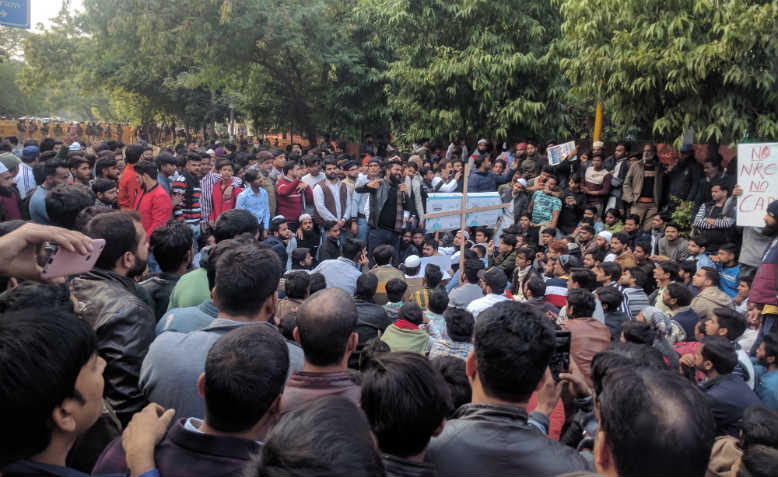 Students at JMI university protest against the CAA, New Delhi. Photo: Wikimedia Commons
Students at JMI university protest against the CAA, New Delhi. Photo: Wikimedia Commons
A popular uprising is spreading across India confronting the fascism of the Modi regime, reports Amrit Wilson
Since the far-right BJP government came to power in India in 2014, it has enacted a series of measures to make the country into an exclusive Brahminical Hindu state. This has reached fever pitch since Modi was re-elected in May 2019. Not only has the on-going epidemic of mob-lynching and murderous attacks on minorities, Dalits, progressive forces, and all those who dissent by far-right thugs sponsored by the BJP intensified, but fascistic legal measures have been instituted. These include the annexation, in August 2019, of the semi-autonomous state of Kashmir, the only Muslim majority state in the country (already under military occupation) followed by land grabs and the imposition of Israeli-style settler colonialism, and the Supreme Court-sanctioned transfer of the land on which the iconic Babri Masjid had stood for some 500 years, before it was demolished by BJP’s stormtroopers, to a Hindu right wing organisation for the construction of a massive Ram temple.
But now, a spark has been lit and a popular uprising is spreading across India confronting the fascism of the Modi regime. The tipping point has been a new citizenship law, the Citizenship Amendment Act (CAA), which breaches international law, violates India’s secular constitution, and effectively provides a pathway for ethnic cleansing.
Students, women, Muslims, Dalits, Adivasis, workers, and farmers are taking to the streets. There are vast demonstrations, marches, on-going mass protests at universities – with many including those in Jawaharlal Nehru University, Jamia Millia Islamia and Aligarh Muslim University being met with unspeakable violence.
On 8 January, a massive general strike took place bringing together diverse Left Trade Union Federations and involving 25 million workers, farmers and rural labourers.
But perhaps most remarkably there are vast on-going sit-ins led by Muslim women with hundreds of thousands participating. These started in Shaheen Bagh, a locality in Delhi, and have been replicated all over the country – in towns, small and big, across India. They are creating a revolutionary culture of peaceful resistance, creativity and unity.
In another important development, youth from across the country took to the streets to defend the Constitution with public declarations and marches across India. The CAA offers Indian citizenship to non-Muslim minorities from neighbouring Pakistan, Afghanistan and Bangladesh who are living in India, but excludes Muslims, even those severely persecuted, such as Ahmadiyyas from Pakistan and Rohingyas from Myanmar. It also excludes Tamils from Sri Lanka.
The CAA will be used in tandem with a National Register of Citizens (NRC) which demands that people prove their citizenship status with legal documents going back decades, a near impossibility for many poor people. The CAA aims to give citizenship to the large proportion of Hindus caught in the snare of the NRC, making it essentially an exercise to exclude Indian Muslims from citizenship. The NRC has already been implemented in the state of Assam where it has labelled two million people infiltrators and made them stateless non-citizens. It is to be extended to the whole of India along with an even more exclusive National Population Register.
The enactment of the CAA has been followed by horrific state and far-right violence, Muslim neighbourhoods and homes have been invaded by the police and fascist mobs, young men murdered, women, children and elderly people beaten up and tortured and property destroyed. Massive fines have now been imposed on the victims.
There have been large solidarity protests by Indians across the world, including in the UK, despite the active presence of the Hindu far-right here. The idea that Modi has overwhelming support in the Indian diaspora is being decisively challenged. Mobilising and supporting these protests must be a priority for the movement.

